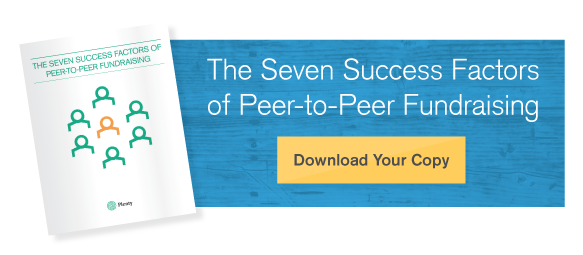Speak Up, Idealists: Lessons Learned From Being An Introvert
We all have behavioral preferences. For instance, some of us take pleasure in putting things in order, while others thrive in chaos. Some prefer to have a wide range of acquaintances, while others seek intimate connections with a close group of friends. Some of us make decisions based on facts, while others use intuition to drive their thought process. The point is we all have preferred ways of operating, and these preferences impact how we interact and work alongside others.
Many of us seek to understand these preferences especially in a professional setting, which is why you have most likely heard of or been asked to take the Myers Briggs Assessment at some point in your career. And in a world of Buzzfeed quizzes and Skimm articles this is quite a doozy of a personality test. Comprised of over 100 questions, it categorizes personalities into sixteen distinct types based on how you gain energy, gather information, decide upon or draw conclusions from information, and deal with the world.
I’m an INFP, also known as the “Idealist” – and as such I’m well suited for careers in social work, community service management, and fundraising. Whether or not you share this specific four-letter personality type (to find out, you can take an unofficial version here), I’d venture to guess that we share some commonalities since you’re reading this blog.
You, like me, probably care deeply about values, people, and relationships – and constantly evaluate the quality of those elements in your life. You wonder whether or not you’re making an impact, whether you can effect change, and what the state of the world will be in ten years. You may strongly defend your ideals, but few people may know what those ideals look like.
In professional endeavors, you may keep your opinions to yourself – even though you clearly see areas of opportunity or concern in your team or organization, and you’ve even spent time fleshing out solutions. Perhaps you want to lead your organization’s first peer-to-peer fundraising endeavor, or spearhead a feasibility assessment and potential development of a signature event, or maybe you’d just like to see your organization start to make data-driven decisions. Your solutions may look different than these, but the point is you have thought about your organization’s opportunities for improvement and all of the options available.
The crucial thing to consider here is, what happens to those ideas once you brainstorm them? Are they ever articulated? Do they surface, only to lie dormant, and then fizzle out? Are they met with head nodding, only to be siphoned onto the plate of another team member? Are they stonewalled because senior leadership will never “buy-in”? Or, and this is a tough one, are they set aside because you aren’t yet seen as a leader?
If you’re an idealist with big ideas, a small voice, and a thirst for responsibility, here are five important reasons via Forbes and Plenty, on why using your voice is critical to your advancement, your team, and the development of your organization.
1. Dialogue Improves Job PerformanceWhether working on a new initiative or day-to-day tasks, your performance at work will improve the more you engage your co-workers in dialogue. Conversations with teammates inspire interaction, ideation, and differing perspectives. Those around you will appreciate being included in your thought process, and you in turn will benefit from their unique experiences and opinions.
Consider every conversation you have as part of a discovery and research process. This mindset will help you arrive at better outcomes as you source ideas and questions from outside perspectives. This is equally true for creative processes like campaign concepting, copywriting, or graphic design as it is for left-brained tasks like operational planning, budgeting, or project management. When you work on our own you risk overlooking key details and opportunities, so remember to bring others into your brainstorming and decision making process to ensure you are driving the best ideas forward.
2. The Right Tone Commands RespectThink back to your last team meeting. Chances are, there were a few participants who shared their opinions and asked questions almost as soon as they came to mind, while others kept quiet unless directly asked to chime in. And although the frequent contributors may get tuned out every once in a while, they’re overall probably commanding more respect than those individuals with tight lids. Because no matter how brilliant or insightful the opinion, it can’t be respected if it isn’t shared.
While you don’t have to speak up at every opportunity, developing a consistent, confident voice will earn you more respect. You’ll also be able to garner support from your co-workers, find new collaborators and resources, and develop relationships that you can later leverage for advancement.
3. A Strong Voice Creates OpportunitiesYour voice is your visibility. And whether or not your supervisor or senior-level staff is present in all of your meetings, word of your talents will rise to the top if you’re consistently contributing in the workplace. And once you’re on the organizational or departmental radar, you’ll be tapped to lead meetings, work on new initiatives, and provide input on strategic plans.
Every meeting is an opportunity to better position yourself for unexpected opportunities, so take advantage of that time and demonstrate your value. After you’ve done that consistently, start to measure your effectiveness and how much you’re recognized for your attention and energy. If you still find yourself on the outside after a few months, then it’s time to have a more formal conversation about culture and advancement.
4. A Consistent Stance Builds Personal BrandWe all know what professional brands look like. Whether it’s your LinkedIn profile page, your curriculum vitae, or your voice on your organization’s blog, the combined elements of personality and experience determine how your peers and the industry at large see you. And although it’s important to build out a robust resume, there’s a human element to your personal brand as well that cannot be neglected. This most obviously manifests itself when you attend industry conferences, contribute to forums, write for a blog, or lead trainings, webinars, and presentations.
These external activities must then be supported by the way that you treat and communicate with your co-workers in the office. Are you supportive and reliable? Are you empathetic? Do you infuse responsibilities with positive energy? Consider each of these in turn, and build out a brand that you're excited and proud to promote.
5. Your Boss Isn't A Mind ReaderAs a private person, you might assume that your flexibility and tendency to fly under the radar makes your boss’s life easier. After all, you generally see the upsides of their recommendations, fill the roles being suggested for you, and keep your head down and get work done. But consider their concerns and responsibilities for a moment: they’re trying to innovate, create change, and fire up the team. These are hefty goals, and they can’t be achieved alone.
All conversations are two-way streets, regardless of their verticality on the organization’s ladder. Take time to provide feedback, even if it’s affirmation or gratitude. Your input doesn’t have to be radical to be appreciated. The energy that your boss currently spends worrying about your opinions could then be channeled into creating opportunities for growth.
Have confidence in your experience and insights. You are your best advocate, and your voice is the best way to garner support for your value. So, next time you find yourself stewing over the decision making process behind a new campaign, or wondering whether or not your team members buy in to your organization’s mission, speak up. Idealists can’t change the world alone.
Take your ideas and opinions to the next level using our Seven Success Factors framework. This framework will help you organize and prioritize your peer-to-peer program ideas and plans so you can create the most impact!
Share this
You May Also Like
These Related Stories

4 Things To Know About DIY Fundraising

What To Do When Culture Is The Problem




No Comments Yet
Let us know what you think